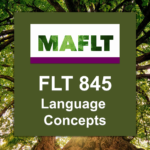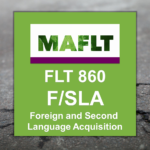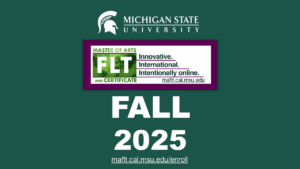Course Descriptions and Sample Syllabi
Scroll down for a description and recent syllabus for each course.
When are These Courses Available?
See also: MSU Class Search > student.msu.edu
Can I start at any time?
Courses are offered in Spring, Summer, and Fall semesters. New students can begin in any semester.
Do I have to be teaching?
Students are not required to be teaching while enrolled, but those with at least two years of full-time teaching are better prepared to thrive. Most course requirements draw upon and contribute to the realities of language classrooms, language programs, and language use.
How are courses structured?
Most courses consist of 12 modules and major assignments, with required participation every week through tasks, discussions, and occasional virtual meetings.
FLT Content Courses
24 credits
for Master of Arts
9 credits
for Certificate
Fully online, asynchronous courses designed for working professionals in a wide variety of languages, locations, and contexts. Our teacher-learners interact with each other and with faculty who are experienced language teachers and teacher educators while improving their teaching effectiveness and growing as leaders in the field.

Foreign Language Teaching Methods
History of methods in foreign language instruction. Current practices in language teaching, materials design, and classroom management. Techniques in teaching culture, listening, speaking, reading, and writing at various levels of student proficiency in the foreign language. How to motivate and maintain motivation. Strategies instruction and targeting advanced proficiency.
3 Credit Hours (75 CEUs or PD Hours)
Recent Syllabus: FLT 807 Methods of FLT

Assessment in Language Teaching
Classroom diagnostic and achievement assessment. Reliability and validity of language tests. Standardized and performance-based testing. Program-level assessment. Measuring language proficiency in listening, speaking, reading, writing, and grammar, and as integrated skills. Formative and summative assessment. Alternative assessment methods.
3 Credit Hours (75 CEUs or PD Hours)
Recent Syllabus: FLT 808 Assessment in FLT

Culture and Intercultural Competence in Language Teaching
Methodologies for teaching culture in foreign language courses. Definitions of culture. Interrelatedness of language and culture. Application of theory to development of culture teaching strategies for any foreign language course.
3 Credit Hours (75 CEUs or PD Hours)
Recent Syllabus: FLT 815 Culture and Intercultural Competence

Program Development and Administration
Current issues in language program administration and development. Practical application of theory in foreign language program development, marketing, articulation, technology integration, supervision, curriculum design, program evaluation, and teacher training.
3 Credit Hours (75 CEUs or PD Hours)
Recent Syllabus: FLT 817 Program Dev & Admin

Language Concepts (Linguistics for Language Teachers)
Methodologies for teaching phonological, morphological, syntactic, lexical, discourse and pragmatic systems in foreign language courses. Methods of analyzing authentic language using corpus-based tools. Pedagogy of grammar and vocabulary in communicative language teaching.
3 Credit Hours (75 CEUs or PD Hours)
Recent Syllabus: FLT 845 Language Concepts

Foreign / Second Language Acquisition (F/SLA)
Theories of second language acquisition and overview of research methods used to analyze language learning and teaching. Important concepts in SLA and areas of research including the influences of age, motivation, language input and interaction, education abroad, social influences, the role of the native language, and language universals.
3 Credit Hours (75 CEUs or PD Hours)
Recent Syllabus: FLT 860 Foreign / Second Language Acquisition (F/SLA)

Teaching with Technology
Practical and theoretical overview of instructional technology used in the teaching of additional languages. Design of materials and modules for online language teaching. Interaction and feedback in online environments. Managing innovation and teacher development in regard to technology. Specific content related to using games and generative artificial intelligence for language teachers and learners.
3 Credit Hours (75 CEUs or PD Hours)
Recent Syllabus: FLT 881 Technology in Language Teaching
Special Topics in Language Teaching and Applied Linguistics
Selected topics and issues in foreign language learning and teaching. The topics of FLT 841 are determined by the professor teaching the course and may vary from year to year. See below for course topics that are regularly offered: Sociolinguistics and Spoken Language, Literacy and Biliteracy, and Individual Differences.
3 Credit Hours (75 CEUs or PD Hours)

Recent syllabus: Sociolinguistics & Spoken Language

Recent syllabus: Literacy and Writing Instruction

Recent syllabus: Individual Differences and Accessibility
Experiential Module – 5 credit hours
The Experiential Module is an extensive project that plays a similar role to a thesis in more traditional graduate programs. These projects are designed to provide opportunities for working professionals in the field of language education to consolidate what they have learned during the MAFLT, investigate topics and contexts that align with their interests, and produce materials from research papers to interactive classroom activities that can be used by other language teachers.

FLT 885 Course Description
The EM course is relatively self-directed but includes a variety of scaffolding and planning materials and involves meeting regularly with the EM Mentor. The specific structure, goals, and deliverables to be created during the course are negotiated between the mentor and the teacher-learner at the beginning of the semester.
5 Credit Hours total, completed as one large project or two smaller projects
Recent Syllabus: FLT 885 Experiential Modules
MAFLT students may enroll in an Experiential Module with approval of the Program Director. The EM Application in which students propose their EM project is due by the midpoint of the prior semester. Students may choose from the existing list of Experiential Modules or design other Experiential Modules in consultation with the Program Director and Experiential Module course instructor. To learn more about Experiential Modules and explore EM projects completed by MAFLT Alumni, see:
Currently available Experiential Modules include the following project types:
- Action Research Project (5 credits)
- Ethnographic Research Project (5 credits)
- Community Outreach, Advocacy, and Grant Writing (5 credits)
- Language or Area Studies Immersion (5 credits)
- Teaching Practicum (5 credits)
- Professional Development or Teacher Supervision (5 credits)
- Developing an Assessment Tool (5 credits)
- Program Evaluation or Review (5 credits)
- Professional Seminars for Teachers (2 or 3 credits)
- Materials or Curriculum Design (2, 3, or 5 credits)
- Conference Participation (2 credits)
- Other Project Designs, as negotiated with faculty (2, 3, or 5 credits)
Final Portfolio and Comprehensive Exam - 1 credit hour in last semester
In the last semester of the MAFLT Program, students build an e-portfolio website that presents their accomplishments and experience to a range of audiences in and beyond MSU. These portfolios include each individual’s educational background, language proficiency, teaching experience, and philosophy of language teaching, as well as representative projects created throughout the program. Students also provide a summary of their Experiential Module projects and share materials that can be used by other language educators. See above for more about locating resources through the MAFLT Showcase site.

FLT 898 Final Portfolios Course
The Final Portfolio course includes guidance on planning and building the portfolio website as well as opportunities to reflect on the impact of the MAFLT Program and the work the teacher-learner has completed over the last two to five years.
3 Credit Hours (75 CEUs or PD Hours)
Recent Syllabus: FLT 898 Final Portfolios – Syllabus and Guidelines
The Comprehensive Exam involves review and approval of the portfolio content by appointed faculty members. Once portfolios have been reviewed and approved, they are shared publicly on our website:













